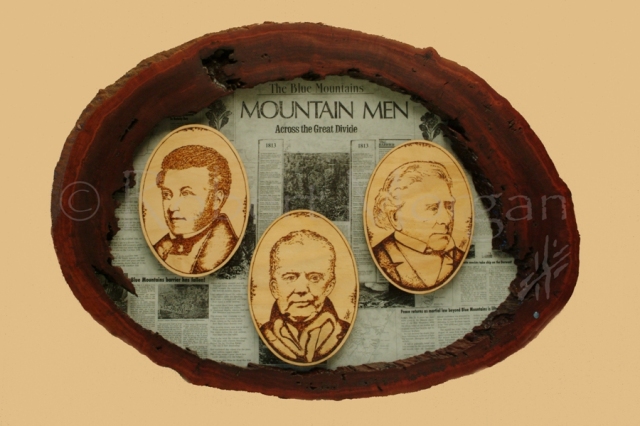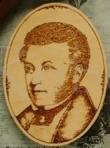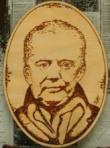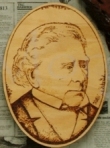The SANDS OF TIME Collection – 15. Across The Great Divide
15. Across The Great Divide
Gregory Blaxland, William Lawson & William Charles Wentworth — 965 x 695 mm
© Robert Morgan

GREGORY BLAXLAND (1778-1853)
Pastoralist and Explorer
 Gregory Blaxland was born into a wealthy English family at Fordwich, Kent, England on 27 June 1778 and educated at The King’s School, Canterbury. He emigrated to Australia in 1805 encouraged by the promise of a substantial land grant. He arrived in Sydney on 14 April 1806, accompanied by his wife, children and a number of servants, and was granted 4000 acres and forty convict labourers.
Gregory Blaxland was born into a wealthy English family at Fordwich, Kent, England on 27 June 1778 and educated at The King’s School, Canterbury. He emigrated to Australia in 1805 encouraged by the promise of a substantial land grant. He arrived in Sydney on 14 April 1806, accompanied by his wife, children and a number of servants, and was granted 4000 acres and forty convict labourers.
Blaxland was one of the first ‘respectable’ settlers in New South Wales and as such he expected privileged treatment from the Government. When favoured treatment was not forthcoming he argued bitterly with the administration. He actively agitated for the removal of Governor Bligh, fell out with Major Johnston, and had an acrimonious relationship with Governor Macquarie.
By 1813 Blaxland’s farming interests were so large that he realised the necessity of finding fresh grazing lands beyond the Blue Mountains. That year he was granted permission to leas an expedition and , accompanied by W. C. Wentworth and William Lawson, he successfully traversed the range. It is this successful crossing of the Blue Mountains which stands as Blaxland’s greatest achievement. He returned to the Sydney basin where he continued to farm until his death in 1853. In 1826 he was a founding member of the Sydney Chamber Commerce and the following year he actively promoted the causes of trial by jury and ‘taxation by representation’. In 1829 he successfully petitioned the Colonial Office for 40 000 acres for tobacco growing. When he failed to start the project Governor Darling cancelled the land grant. Always a moody and emotional person, on 1 January 1853 Blaxland hanged himself.
◊
WILLIAM LAWSON (1774-1850)
Pastoralist and Explorer
 William Lawson was born at Finchley, London on 2 June 1774. He was trained as a surveyor. In 1799 he joined the British Navy and the following year he was posted to Norfolk Island. Lawson pursued a typical colonial career moving from posting to posting, engaging in a little farming, and being active in the colony’s law courts. He was promoted to the position of Lieutenant, acquired property at Concord and Prospect, acted on a number of courts martial, became Major Johnston’s aide-de-camp and, by 1812, had made enough money to build a forty-room mansion at Prospect.
William Lawson was born at Finchley, London on 2 June 1774. He was trained as a surveyor. In 1799 he joined the British Navy and the following year he was posted to Norfolk Island. Lawson pursued a typical colonial career moving from posting to posting, engaging in a little farming, and being active in the colony’s law courts. He was promoted to the position of Lieutenant, acquired property at Concord and Prospect, acted on a number of courts martial, became Major Johnston’s aide-de-camp and, by 1812, had made enough money to build a forty-room mansion at Prospect.
Lawson’s fame as an explorer came when Blaxland and Wentworth invited him accompany them on an attempt to cross the Blue Mountains. Lawson’s skill as a surveyor proved invaluable on the expedition. He was rewarded with 1000 acres near Bathurst on the Campbell River. From 1819 to 1824 he was commandant of the new settlement at Bathurst.
In the early 1820s Lawson continued his explorations in the Mudgee area but it was his grazing interests which became really important. By 1828 he owned over 200 000 acres on which he grazed 84 000 sheep and nearly 15 000 head of cattle. Lawson was elected to the New South Wales Legislative Council in 1843 and served until 1848. He died on 16 June 1850.
◊
WILLIAM CHARLES WENTWORTH (1790-1872)
Statesman and Explorer
 William Charles Wentworth was born in 1790, at either Sydney or Norfolk Island or on a ship sailing between the two. Although his place of birth appears uncertain, Wentworth’s concept of his place in history was never in doubt. Wentworth was brought to Sydney in 1796 from Norfolk Island, where his father, D’Arcy Wentworth, was surgeon for a time. He was sent to England to be educated, returning to New South Wales in 1810. He returned to England in 1816 to study law and became a barrister in 1822 and went back to Sydney two years later.
William Charles Wentworth was born in 1790, at either Sydney or Norfolk Island or on a ship sailing between the two. Although his place of birth appears uncertain, Wentworth’s concept of his place in history was never in doubt. Wentworth was brought to Sydney in 1796 from Norfolk Island, where his father, D’Arcy Wentworth, was surgeon for a time. He was sent to England to be educated, returning to New South Wales in 1810. He returned to England in 1816 to study law and became a barrister in 1822 and went back to Sydney two years later.
In his fifties he was able justifiably to say that he had brought to the people of New South Wales freedom of the press, trial by jury and self-government through elected representatives. As well he was one of the earliest advocates of Federation for all the Australian colonies, he espoused the cause of full legal and civil rights for emancipists (freed convicts), and played a leading role in establishing the State’s public primary education system and in founding the University of Sydney. With Gregory Blaxland and William Lawson he made the first crossing of the Blue Mountains in 1813. He was the first Australian-born holder of important public office (appointed Acting Provost-Marshal at the age of eighteen by Governor Macquarie in 1811) and the first to publish a book (a treatise on the colonies in New South Wales and Tasmania and the attractions they offered for immigrants, published in 1819).
Wentworth returned to England in 1862 when the political pendulum had been set swinging against his ultra-conservatism with the introduction of votes for all adult males and he died there on 20 March 1872. His body was returned to Sydney where he was given a state funeral.
◊
